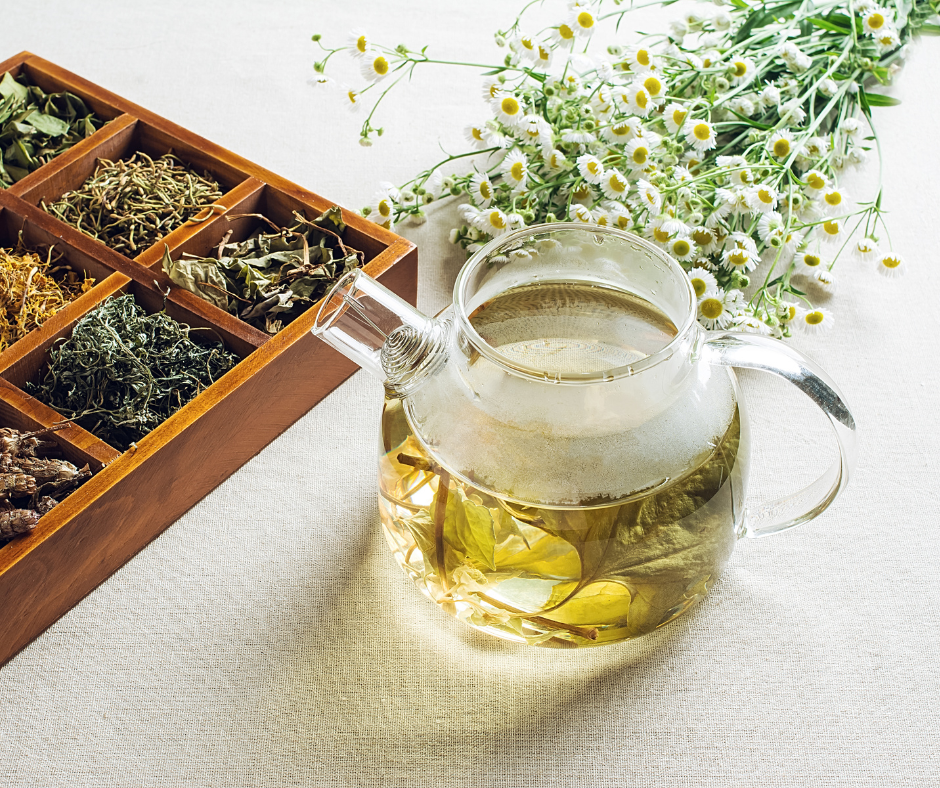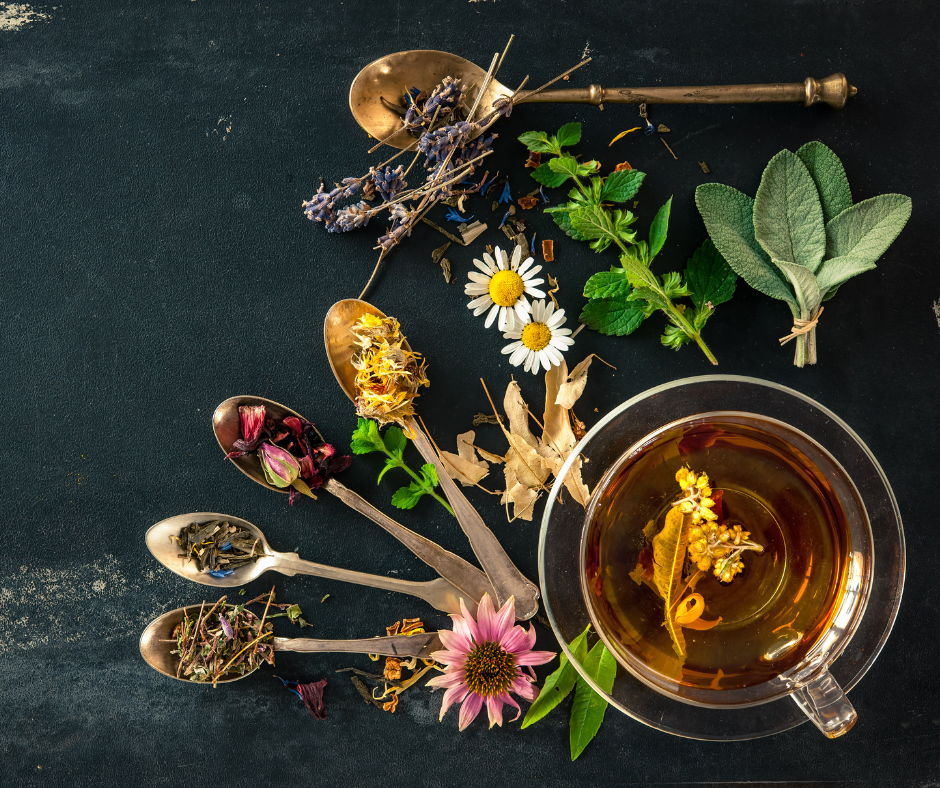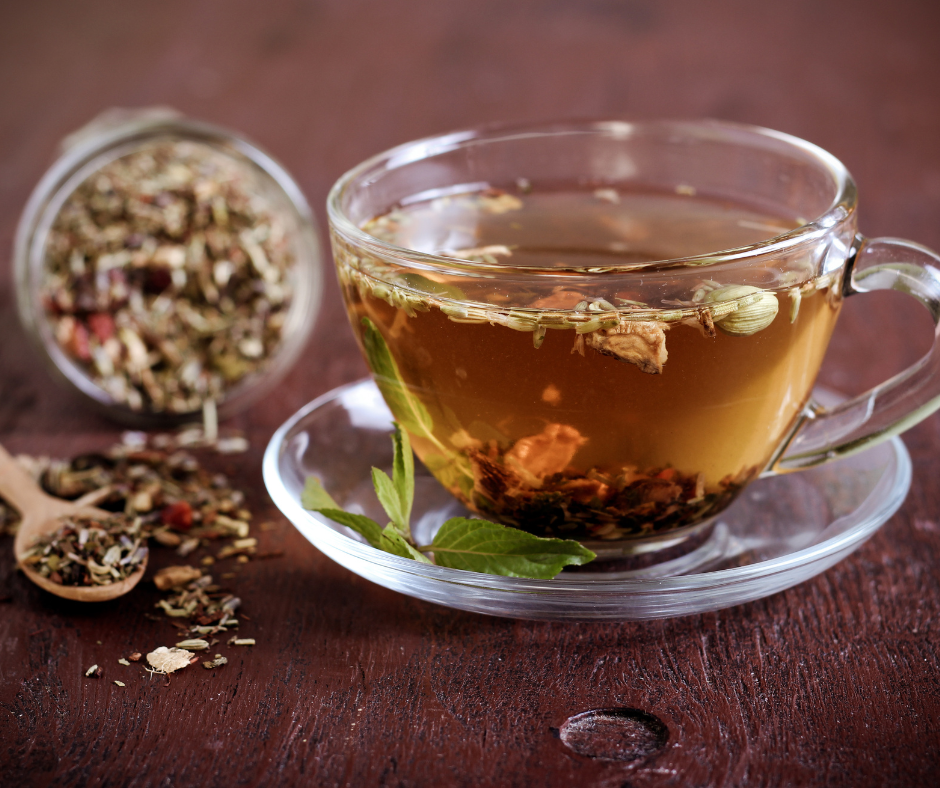Introduction
For those seeking a soothing beverage without caffeine, herbal tea presents a delightful alternative. But Does Herbal Tea Have Caffeine? Let’s dive into the world of herbal tea and uncover its caffeine-free wonders.
The answer is both yes and no. Traditional teas, such as black, green, and white tea, are derived from the Camellia sinensis plant and naturally contain caffeine. However, herbal teas are made from various plants, flowers, and herbs other than Camellia sinensis, making them naturally caffeine-free.
Herbal teas, or tisanes, are crafted by infusing various parts of plants, including leaves, flowers, stems, and roots, in hot water. Their caffeine-free nature makes them an excellent choice for those sensitive to caffeine or who prefer to avoid it altogether.
Exploring The Caffeine-free World Of Herbal Tea
Herbal teas come in various flavors, aromas, and potential health benefits. Let’s take a closer look at some popular caffeine-free herbal teas and their unique characteristics:
- Chamomile Tea: Known for its calming properties, it offers a gentle and soothing experience. It is often enjoyed before bedtime to promote relaxation and a restful night’s sleep.
- Peppermint Tea: Refreshing and invigorating, peppermint tea is celebrated for its cooling sensation and ability to aid digestion. It is commonly enjoyed after meals to support a healthy digestive system.
- Rooibos Tea: Hailing from South Africa, rooibos tea boasts a rich flavor profile reminiscent of nutty and fruity undertones. It is packed with antioxidants and is known for its potential anti-inflammatory properties.
- Hibiscus Tea: Vibrantly red and tangy, hibiscus tea offers a refreshing tart flavor. It is beloved for its potential ability to support heart health and reduce high blood pressure.
- Ginger Tea: Served hot or cold, ginger tea delivers a comforting and spicy kick. It is renowned for its potential anti-inflammatory effects and ability to soothe an upset stomach.
Embracing the world of herbal tea provides a wide range of flavors, each offering unique benefits. Whether you’re seeking relaxation, digestion support, or a burst of tangy flavor, herbal teas have you covered.
In conclusion, herbal teas are a wonderful caffeine-free alternative for those looking to sip serenity without the effects of caffeine. With a vast selection of flavors and potential health benefits, exploring the world of herbal teas is a delightful and invigorating journey for the tea lover. So steep a cup of herbal tea and savor the tranquillity it brings.
The Allure Of Herbal Tea
For tea enthusiasts everywhere, there’s nothing quite as comforting as a warm cup of herbal tea. But what sets herbal tea apart from other varieties? One of the most appealing qualities of herbal tea is that it is naturally caffeine-free. Instead of relying on the stimulating effects of caffeine, herbal tea blends are made from various soothing herbs, flowers, and fruits. This makes it the perfect beverage choice for those looking to unwind and relax without the jolt of energy that comes from caffeine.
Naturally Caffeine-free Blends Of Soothing Herbs, Flowers, And Fruits
Unlike traditional tea, which is typically made from the leaves of the Camellia sinensis plant, herbal tea is made from various herbs, flowers, and fruits. This means that herbal tea is naturally free of caffeine. Instead of boosting energy, herbal tea is known for its calming and soothing properties. Whether you prefer the chamomile’s floral notes, the rooibos’ earthy taste, or the refreshing flavors of peppermint and hibiscus, there is an herbal tea blend to suit every palate and preference.
Does Herbal Tea Have Caffeine?
When discussing herbal tea, one common question is ‘Does Herbal Tea Have Caffeine?’. It’s important to note that while herbal tea is accurately referred to as “tea,” it contains no tea leaves. Therefore, it does not contain caffeine. This is good news for those sensitive to caffeine or who prefer to avoid it altogether. So when you reach for a cup of herbal tea, you can sip away, knowing it won’t keep you up at night or leave you feeling jittery.
Herbal Tea As A Popular Choice For Tea Lovers Seeking Alternatives To Caffeinated Beverages
With more and more people looking for alternatives to caffeinated beverages, herbal tea has become an increasingly popular choice. Not only does it offer a wide range of delicious flavors and aromas, but it also provides a host of health benefits. Many herbal teas are believed to have medicinal properties, such as promoting digestion, reducing stress, and aiding in sleep. Additionally, herbal teas are often packed with antioxidants, vitamins, and minerals, making them a nourishing choice for overall well-being.
Whether you want to unwind after a long day, find a caffeine-free option, or explore new flavors, herbal tea is a delightful and healthy choice. So, sip your way to serenity with a comforting cup of caffeine-free herbal tea.
Savoring The Caffeine-free Indulgence
For those seeking a soothing and refreshing alternative to traditional tea or coffee, herbal tea offers a delightful and caffeine-free experience. Contrary to popular belief, herbal tea is not derived from the tea plant (Camellia sinensis) and therefore does not contain caffeine. This makes it an excellent choice for those who want to enjoy a warm and comforting beverage without the stimulating effects of caffeine.
Embracing The World Of Herbal Tea For A Tranquil Escape From Caffeine’s Grasp
Herbal tea, or tisane, is created by infusing various herbs, spices, flowers, fruits, or other botanical ingredients in hot water. The result is a flavorful and aromatic brew that can be enjoyed anytime or night without worrying about disrupting sleep patterns or experiencing caffeine-related side effects.
The wide variety of herbal teas available ensures that there is something for everyone’s taste buds. From calming chamomile to refreshing peppermint, there are endless options. Each herbal tea offers unique health benefits, such as aiding digestion, boosting the immune system, or promoting relaxation and stress relief.
A Symphony Of Flavors Without The Caffeine Jitters
One of herbal tea’s standout advantages is its multitude of flavors and aromas whether you prefer hibiscus’s fruity sweetness or rooibos’ earthy notes, herbal tea suits every palate.
Furthermore, herbal teas can be enjoyed hot or cold, making them a versatile beverage choice throughout the year. During the winter, a steaming cup of herbal tea can provide warmth and comfort, while in the summer, a tall glass of iced herbal tea can be a refreshing and hydrating option.
In addition to their delicious taste, herbal teas are often praised for their potential health benefits. For example, chamomile tea is known for its calming properties and may help promote better sleep. Peppermint tea is often used to soothe digestive discomfort; ginger tea can relieve nausea.
With an array of flavors and potential health benefits, it’s no wonder that herbal tea has gained popularity worldwide. From cafes and specialty tea shops to the comfort of your home, herbal tea is easily accessible and offers a caffeine-free indulgence.
In conclusion, herbal tea provides a caffeine-free alternative to traditional teas and coffee. Its diverse flavors, potential health benefits, and versatility make it a delightful option for those seeking a tranquil escape from the grasp of caffeine. So, sip a cup of herbal tea and savor its serenity.
The Plethora Of Possibilities
Diverse Array Of Flavors And Potential Health Benefits Of Herbal Tea
Herbal tea, with its wide range of flavors and potential health benefits, has gained popularity among tea enthusiasts worldwide. Unlike traditional teas such as black, green, or oolong, herbal tea contains no caffeine, making it a refreshing and calming alternative. But what exactly is herbal tea, and what makes it so special?
Herbal tea, known as tisane, is made from various plants, herbs, flowers, fruits, and spices. It does not contain any leaves from the Camellia sinensis plant, which is the source of true teas. Instead, herbal teas are created by steeping these natural ingredients in hot water, allowing their flavors and health properties to infuse.
Beyond their caffeine-free nature, herbal teas offer diverse flavors that tickle the taste buds and soothe the senses. From the zesty tang of citrus to the soothing warmth of ginger, there is an herbal tea for every palate. Some popular herbal teas include chamomile, peppermint, hibiscus, lavender, and rooibos. Each has its unique flavor profile and potential health benefits, such as aiding digestion, promoting relaxation, boosting the immune system, or relieving stress.
Celebrating The Joys Of Herbal Tea—a Delightful And Caffeine-free Elixir
The joy of sipping herbal tea goes beyond its delightful flavors and potential health benefits. This ritual allows individuals to pause, unwind, and find serenity in their day. Whether enjoyed alone or shared with friends, herbal tea provides a moment of tranquillity in a fast-paced world.
One of the most appealing aspects of herbal tea is its versatility. It can be enjoyed hot, providing comfort on a chilly day or soothing relief during illness. Alternatively, herbal teas can be brewed as iced teas, offering a refreshing and hydrating option during summer. Some herbal teas can even be used as a base for creative and delicious mocktails or added as flavor enhancers in culinary recipes.
Beyond its versatility, herbal tea is a popular choice for those looking to reduce their caffeine intake. Many people enjoy the ritual of tea drinking but may be sensitive to the effects of caffeine. Herbal tea provides a perfect solution, offering a satisfying beverage without any of the jitters or sleep disturbances often associated with caffeine consumption.
In conclusion, herbal tea is a delightful, caffeine-free elixir with diverse flavors and potential health benefits. Whether you’re a tea enthusiast looking to explore new tastes or seeking a calming and soothing beverage, herbal tea is a fantastic choice. So grab your favorite herbal blend, steep it to perfection, and savor every sip of this beverage that celebrates taste and well-being.
FAQ: Does Herbal Tea Have Caffeine? – Sipping Serenity: The Caffeine-Free World of Herbal Tea
Q: Does herbal tea contain caffeine?
A: No, herbal tea is naturally caffeine-free. Unlike traditional teas, which are derived from the Camellia sinensis plant and contain caffeine, herbal teas are made from a variety of herbs, flowers, fruits, and other botanical ingredients that do not contain caffeine.
Q: What are some common ingredients in caffeine-free herbal teas?
A: Caffeine-free herbal teas are typically made from a blend of various herbs, flowers, and botanicals. Common ingredients found in these teas include lemon verbena, rooibos, chamomile, lemon balm, linden flowers, anise, cinnamon, orange peel, and passionflower. These ingredients not only offer a soothing and aromatic experience but also provide various health benefits.
Q: Are caffeine-free herbal teas suitable for everyone?
A: Yes, caffeine-free herbal teas are suitable for almost everyone. Since they do not contain caffeine, they are a great option for those who are sensitive to caffeine or looking to limit their caffeine intake. Additionally, herbal teas are often infused with natural antioxidants and other beneficial compounds that can promote relaxation, improve digestion, and support overall well-being.
Q: Can I drink herbal tea before bed?
A: Absolutely! Herbal teas are an excellent choice for bedtime as they are naturally caffeine-free and can help promote relaxation and a restful night’s sleep. Certain herbal teas, such as chamomile and lavender, are particularly well-known for their calming properties and are often used as nighttime blends to enhance sleep quality.
Q: Are there any health benefits associated with herbal tea?
A: Yes, herbal tea is renowned for its numerous health benefits. Depending on the ingredients used, different herbal teas can provide various advantages. For example, chamomile tea is known for its calming and stress-relieving properties, while ginger tea can aid digestion and soothe an upset stomach. Other herbal teas, such as peppermint and hibiscus, are known for their refreshing and revitalizing qualities.
Q: Can I use herbal tea for gift-giving?
A: Absolutely! Caffeine-free herbal teas make for a thoughtful and soothing gift option. Many non-profit organizations also purchase herbal teas for gifting purposes. The Cup of Serenity Caffeine-Free Herbal tea, with its blend of lemon verbena, rooibos, chamomile, lemon balm, linden flowers, anise, cinnamon, orange peel, and passionflower, is a particularly popular choice for those seeking a tranquil and comforting tea experience.
Q: How do I brew caffeine-free herbal tea?
A: To brew caffeine-free herbal tea, bring water to a boil (around 212°F) and pour it over the herbal tea bag or loose leaves. Allow the tea to steep for 3 to 7 minutes, depending on your personal preference and the specific instructions provided with your tea. After steeping, strain the tea or remove the tea bag and enjoy the soothing and aromatic flavors of your caffeine-free herbal blend.
Q: Where do the ingredients in herbal tea come from?
A: The ingredients used in herbal teas can vary, but they are often sourced from different regions around the world. For example, lemon verbena, chamomile, and linden flowers are commonly sourced from Egypt, while rooibos are typically sourced from South Africa. By carefully selecting these high-quality ingredients from their respective origins, herbal tea blends offer a delightful and authentic tasting experience.
Conclusion
Herbal tea has long been praised for its soothing effects, making it a popular choice for those looking to unwind and relax. But Does Herbal Tea Have Caffeine? Regarding herbal teas, the good news is that most varieties are naturally caffeine-free. Unlike black, green, and white teas, which come from the Camellia sinensis plant and contain caffeine, herbal teas are made from a combination of herbs, flowers, fruits, and spices. This means they are void of caffeine, making them a perfect choice for individuals sensitive to or trying to avoid caffeine altogether.
However, it’s important to note that not all herbal teas are created equal. While most herbal teas are caffeine-free, there are a few exceptions. For example, Yerba mate and Guayusa, often called herbal teas, are derived from caffeinated plants and thus contain caffeine. It’s always a good idea to check the label or consult with the manufacturer if you are unsure about the caffeine content of a particular herbal tea.
One of the key benefits of herbal tea is its calming and soothing properties. Many herbal teas, such as chamomile, lavender, and peppermint, are known for their relaxation effects, helping to reduce stress and promote a sense of serenity. These teas are often enjoyed before bedtime to aid in a restful night’s sleep.
Additionally, herbal teas are rich in antioxidants, vitamins, and minerals that can support overall health and well-being. From the immune-boosting properties of echinacea to the digestive benefits of ginger, herbal teas offer a natural and tasty way to incorporate beneficial plant compounds into your daily routine.
Disclaimer: Information For Educational And Informational Purposes Only
While herbal teas are generally safe to consume, it’s always wise to consult a healthcare professional if you have any specific health concerns or are pregnant or breastfeeding. Each individual may react differently to different herbs, so listening to your body and paying attention to adverse reactions is important.
In conclusion, herbal tea offers a caffeine-free alternative to traditional teas, making it an attractive option for those looking to enjoy a calming and relaxing beverage without the stimulating effects of caffeine. Whether you’re sipping on chamomile to unwind after a long day or enjoying a refreshing blend of fruit and herbs, herbal tea is full of delicious and soothing options to explore. So go ahead, brew yourself a cup, and savor the serenity!
References:
- https://www.teaclass.com/lesson_0102.html
- https://www.thespruceeats.com/caffeine-in-herbal-tea-765258
- https://www.mydomaine.com/herbal-tea-vs-caffeine

Deb Carlson at Crosslake Coffee: Join Deb at Crosslake Coffee for a delightful blend of community, caffeine, and creativity. Discover the cozy ambiance and warm hospitality that make this local coffee shop a beloved gathering spot. From expertly crafted espresso drinks to mouthwatering pastries, Deb invites you to savor every sip and bite. Stay connected with the latest updates on specials, events, and live music performances by following Deb Carlson at Crosslake Coffee on social media. Embrace the vibrant online community and share your love for great coffee and good company with fellow enthusiasts. Don’t miss out on a moment of the Crosslake Coffee experience – connect with Deb on social media today.



